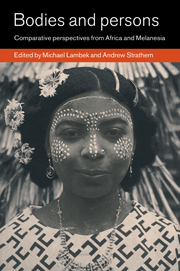Book contents
- Frontmatter
- Contents
- List of illustrations
- List of contributors
- Acknowledgments
- 1 Introduction: Embodying sociality: Africanist–Melanesianist comparisons
- Part I Transcending dichotomies
- 2 “It's a boy,” “it's a girl!” Reflections on sex and gender in Madagascar and beyond
- 3 Modernity and forms of personhood in Melanesia
- 4 Refiguring the person: the dynamics of affects and symbols in an African spirit possession cult
- 5 Body and mind in mind, body and mind in body: some anthropological interventions in a long conversation
- Part II Transitions, containments, decontainments
- Part III From exchange to history
- Bibliography
- Index
5 - Body and mind in mind, body and mind in body: some anthropological interventions in a long conversation
Published online by Cambridge University Press: 05 June 2012
- Frontmatter
- Contents
- List of illustrations
- List of contributors
- Acknowledgments
- 1 Introduction: Embodying sociality: Africanist–Melanesianist comparisons
- Part I Transcending dichotomies
- 2 “It's a boy,” “it's a girl!” Reflections on sex and gender in Madagascar and beyond
- 3 Modernity and forms of personhood in Melanesia
- 4 Refiguring the person: the dynamics of affects and symbols in an African spirit possession cult
- 5 Body and mind in mind, body and mind in body: some anthropological interventions in a long conversation
- Part II Transitions, containments, decontainments
- Part III From exchange to history
- Bibliography
- Index
Summary
The traditional antithesis of the body and soul is not a vain mythological concept that is without foundation in reality.
(Durkheim, The Dualism of Human Nature and Its Social Conditions)I have not elucidated that the soul and the body are identical, I have not elucidated that the soul is one thing and the body another …
(The Buddha, Majjhima-Nikaya Sutta 63)It is with some trepidation that I enter the long conversation on mind and body, a conversation that has included many more strong and subtle positions than I can possibly encompass. This chapter is not an intervention in philosophical arguments so much as an exercise in anthropological ground-clearing; I have no pretensions about resolving philosophical debates between monism and dualism. I take these debates to be constitutive of our philosophical tradition rather than assuming that one position must be foundational and others wrong. What is of equal interest is to start with the philosophical problems – not solutions – of our tradition and then to extend the horizons of these debates to include, in a Gadamerian sense, the philosophical conversations, explicit and implicit, of other societies. It is my suspicion that both monistic and dualistic experiences are inherent in the human condition and hence that mind/body and perhaps even monism/dualism are oppositions like nature/culture and male/female which all cultures, hence all anthropologists, must encounter. In sum, my position is very much like the famous wit who claimed that there are two kinds of thinkers in the world, those who divide the world into two and those who do not.
- Type
- Chapter
- Information
- Bodies and PersonsComparative Perspectives from Africa and Melanesia, pp. 103 - 124Publisher: Cambridge University PressPrint publication year: 1998
- 37
- Cited by

